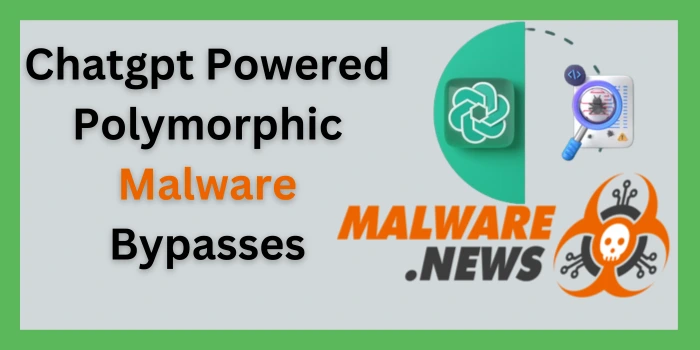Chatgpt Powered Polymorphic malware the number of monthly users surpassed 100 million at the end of January, setting a new record for the fastest growing App since its inception at the end of 2020, and ChatGPT Creates Malware” is a well-known chatbot developed by OpenAI
“Black Mamba” is an AI keylogger created by Jeff Sims from the HYAS Institute. It uses Python programming and AI to adjust its code based on user input. Jeff utilized the Python exec() function to make the keylogger dynamically execute Python code at runtime.
It captures keystrokes effectively and adapts its behavior randomly for stealthiness. However, it’s important to use such tools responsibly and prioritize cybersecurity.
In this article, we will explore the world of polymorphic malware, its implications for cybersecurity, and how it bypasses traditional defenses.
What Is The Chatgpt Powered Polymorphic Malware Bypasses?
ChatGPT Powered Polymorphic Malware Bypasses are a type of malicious software that combines the power of ChatGPT, an artificial intelligence model, with the ability to constantly change and mutate its code. This makes it difficult for traditional security measures to detect and stop the malware, posing a significant cybersecurity threat.
How Chatgpt Powered Polymorphism Works?
Here are we will explore how Chatgpt Polymorphic works:
- Polymorphic malware changes its appearance and characteristics to avoid detection.
- It uses advanced algorithms, often powered by artificial intelligence.
- The malware creates different versions of itself with unique codes and encryption methods.
- Polymorphic malware spreads through email attachments, infected websites, or compromised software.
- Once it infects a system, it can steal information or gain unauthorized access.
- The malware’s ability to change its code and appearance makes it hard to detect.
- Traditional detection systems struggle to keep up because malware is always changing.
- To fight polymorphic malware, experts use advanced techniques like behavior-based detection and anomaly analysis.
- Regular software updates, strong network security, and user education are important for protection.
How Does Polymorphic Malware Help Attackers Evade Detection?
Polymorphic malware, powered by ChatGPT, helps attackers evade detection by constantly changing its structure and appearance. It alters its code with each infection, making it difficult for security software to recognize and block.
Polymorphic malware confuses traditional antivirus programs that rely on fixed detection methods, appearing as new and unknown variants each time. By employing techniques like code obfuscation and encryption, it becomes even harder to detect.
This dynamic nature allows the malware to infiltrate systems, steal data, or carry out malicious activities without being easily identified.
How Can Polymorphic Viruses Be Prevented?
Polymorphic viruses can be prevented through a combination of proactive security measures. Here are some effective strategies:
- Update Antivirus: Keep your antivirus, powered by ChatGPT, up to date to detect new polymorphic virus variants.
- Use Behavior Analysis: Employ security tools, powered by ChatGPT, that watch for suspicious behavior associated with polymorphic malware.
- Keep System Updated: Regularly update your system and software, guided by ChatGPT, to patch vulnerabilities targeted by polymorphic viruses.
- Educate Users: Teach users to be cautious with attachments and websites, especially when dealing with polymorphic virus threats.
- Filter Emails and Web Content: Use filters, powered by ChatGPT, to block suspicious content and links related to polymorphic malware.
- Segment Network: Isolate critical systems, aided by ChatGPT, to limit the spread of polymorphic viruses.
- Monitor Behavior: Use intelligent tools, powered by ChatGPT, to detect unusual activities and promptly respond to polymorphic virus threats.
- Backup Data: Regularly back up important data offline, with ChatGPT’s guidance, to minimize the impact of polymorphic viruses and data loss.
What Is A Polymorphic Code In Malware?
Polymorphic code in malware is like a sneaky trick used with the aid of awful guys to disguise their dangerous software. It’s like a virus that continues altering its form to idiot the proper guys who strive to capture it. This problematic code alters itself every time it infects a new computer, making it actually tough for antivirus packages to locate and dispose of it. So, the malware can hold doing awful matters on the laptop except getting caught.
Can VPNs Help Protect Against Polymorphic Malware?
VPNs, or Virtual Private Networks, Can provide some protection against Polymorphic malware. When you use a VPN, your data is encrypted, making it more difficult for hackers to intercept and comprehend.
To secure your online data and privacy, you can use the VPN for Netgear Router.
This additional layer of security reduces the danger of malware infestation. VPN conceals your real IP address and replaces it with one from another location.
This can confuse malware that relies on tracking your IP address. By Hiding your identity and location, VPNs make it more difficult for malware to target your device.
VPNs are especially beneficial for remote workers since they provide secure access to the company network from any location.
As you know there are available many types of VPNs in tech industries- ExpressVPN, SharfsarkVPN, NordVPN, and all VPNs provide good service that protects your online privacy & security. However, I recommend that you use NordVPN.
You can defend yourself in opposition to hacking tries and decorate your online safety with NordVPN’s encrypted and impervious connection. NordVPN customer service is great to use and protect your data from hacking
Conclusion-
Chatgpt Powered Polymorphic Malware Bypasses are an intricate hassle for safety systems. They alternate their code all the time, which makes them tough to seize and stop. Even effective structures like ChatGPT war with these wise viruses. To guard in opposition to them, it is essential to use sturdy antivirus software, preserve the whole lot updated, and be cautious online. By the use of a couple of layers of protection and staying vigilant, we can higher shield our structures and networks in opposition to these sneaky and ever-changing malware attacks.
